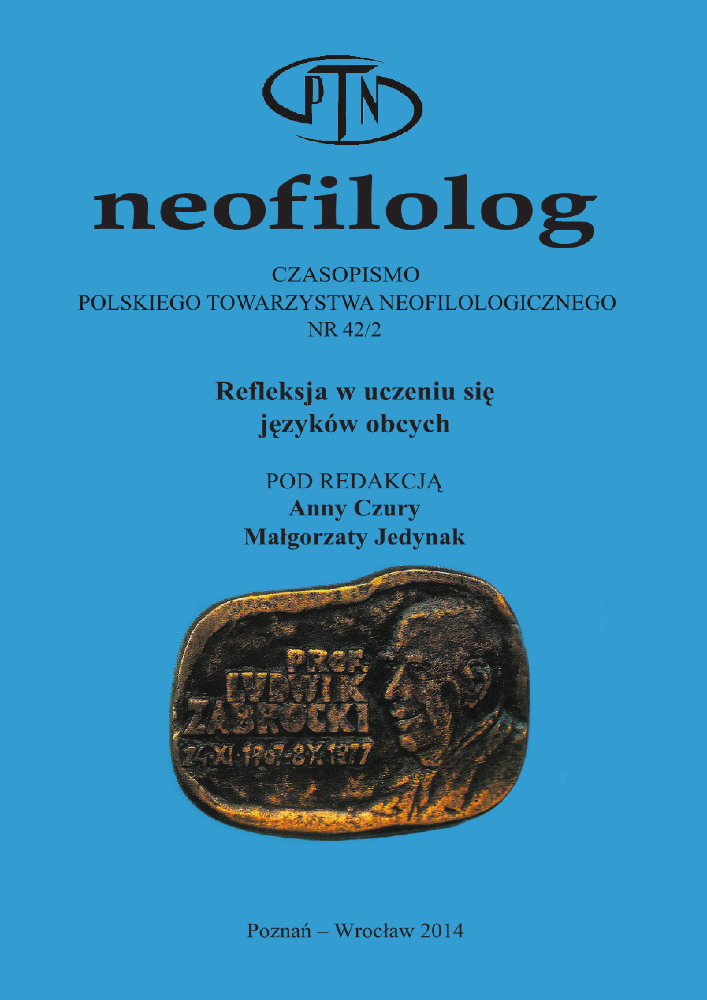Abstract
The Common European Framework of Reference for Languages is a document characterized by a high level of generality, addressed to a wide range of readers. The conceptual paradigm included in the document could constitute the basis for a new trend in language didactics; however, a lot of further work and research should be carried out for the new approach to achieve the status of independent and efficient methodology. The first prerequisite for introducing necessary modifications is a reflexive approach to the recommendations of CEFR, especially those which are methodological in character. The lack of any rules or procedures showing how to facilitate the achievement of learning objectives is the most frequent objection made against the CEFR. The focus on what has to be taught should go along with how to teach and why. Reflexivity which occupies a marginal position in the CEFR has to become a priority for its users if the methodology outlined there is to constitute the new era in language didactics.Literaturhinweise
Beacco, J.-C. 2007. L’approche par compétences dans l’enseignement des langues: enseigner à partir du Cadre européen de référence pour les langues. Paris: Didier.
Bronckart, J.-P., Bulea, E. 2005. „Coda: pour une approche dynamique des compétences (langagières)” (w:) Repenser l’enseignement des langues: comment identifier et exploiter les compétences (red. J.-P. Bronckart, E. Bulea, M. Pouliot). Lille: Presses Universitaires du Septentrion: 193-222.
Castellotti, V. 2002. „Qui a peur de la notion de compétence?” (w:) La notion de compétence en langue – Notions en questions 6 (red. V. Castellotti, B. Py). Lyon: E. N. S. Editions: 9-16.
Janowska, I. 2011. Podejście zadaniowe do nauczania i ucznia się języków obcych. Na przykładzie języka polskiego jako obcego. Kraków: Universitas.
Le Boterf, G. 2010. Construire les compétences individuelles et collectives. Paris: Groupe Eyrolles.
Perrenoud, Ph. 2011. Quand l’école prétend préparer à la vie... – Développer des compétences ou enseigner d’autres savoirs. Paris: ESF Editeur.
Rada Europy. 2003. Europejski system opisu kształcenia językowego: uczenie się, nauczanie, ocenianie. Warszawa: Wydawnictwa CODN.
Richer, J.-J. 2012. La didactique des langues interrogée par les compétences. Fernelmont: E. M. E. & InterCommunications.
Rosen, E. 2006. Le point sur le Cadre européen commun de référence pour les langues. Paris: CLE International.
Lizenz
Copyright (c) 2019 Iwona Janowska

Dieses Werk steht unter der Lizenz Creative Commons Namensnennung - Keine Bearbeitungen 4.0 International.
Autoren:
Die Autoren der zur Veröffentlichung in der Zeitschrift Neofilolog angenommenen Texte sind verpflichtet, den Vertrag über die Erteilung einer kostenlosen Lizenz für die Werke mit der Verpflichtung zur Erteilung einer Sublizenz CC auszufüllen, zu unterzeichnen und an die Adresse der Redaktion zurückzusenden.
Gemäß Vertrag erteilen die Autoren auf die in der Zeitschrift Neofilolog veröffentlichten Texte der Adam-Mickiewicz-Universität in Poznań eine nicht exklusive und kostenlose Lizenz und erlauben die Verwendung der Sublizenz Creative Commons Attribution-NoDerivatives 4.0 International (CC BY-ND 4.0).
Die Autoren behalten das Recht zur weiteren freien Verfügung über das Werk.
Benutzer:
Interessierte Onlinebenutzer dürfen die seit 2017 veröffentlichten Werke unter folgenden Bedingungen nutzen:
- Anerkennung der Urheberschaft - die Verpflichtung, zusammen mit dem verbreiteten Werk Informationen über die Urheberschaft, den Titel, die Quelle (Links zum Originalwerk, DOI) und die Lizenz selbst bereitzustellen;
- ohne Schaffung abgeleiteter Werke - das Werk muss in seiner ursprünglichen Form erhalten bleiben, ohne Zustimmung des Autors dürfen keine Studien, beispielsweise Übersetzungen, verbreitet werden.
Die Urheberrechte aller veröffentlichen Texte sind vorbehalten.
Sonstige:
Die Adam-Mickiewicz-Universität in Poznań behält das Recht auf die Zeitschrift als Gesamtheit (Layout, Grafik, Titel, Umschlagsprojekt, Logo usw.).
